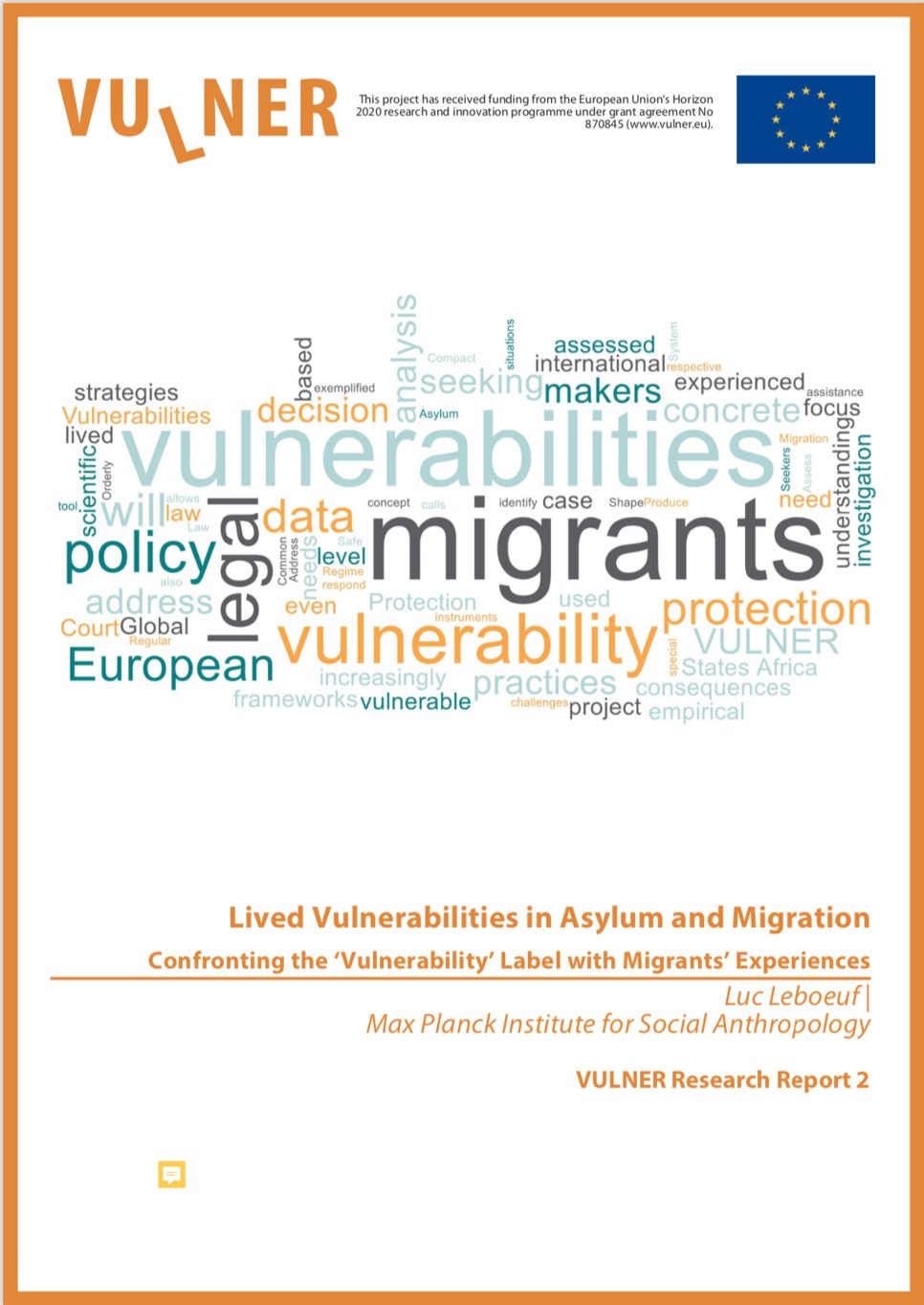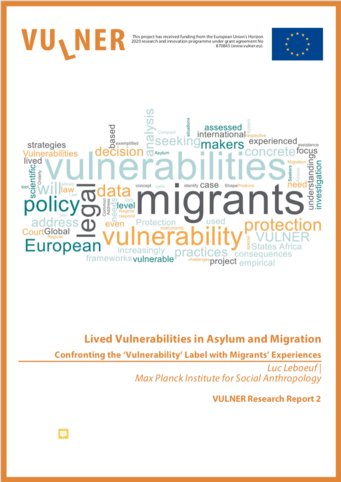Lived Vulnerabilities in Asylum and Migration.
Confronting the ‘Vulnerability’ Label with Migrants’ Experiences
This report introduces the seven country reports that were produced as part of the VULNER project to understand migrants’ experiences of their vulnerabilities, and how they are shaped by the existing legal frameworks governing access to ‘protection’ (broadly understood as including a legal status, such as the refugee status, and access to dedicated services, such as temporary housing for asylum seekers). These reports were drafted following the second research phase of the VULNER project, which focussed on documenting and analysing migrants’ experiences. They follow a first research phase, during which the laws and practices through which institutional actors assess vulnerabilities were documented and analysed in each of the countries under study.

The countries under study are located in Europe (Belgium, Germany, Italy and Norway), Africa (Uganda), the Middle East (Lebanon) and North America (Canada) – thereby mixing Western countries with developing ones in order to draw lessons from the long-standing tradition of mobilizing ‘vulnerability’ as a criterion to identify aid beneficiaries in first countries of asylum. Such lessons are particularly useful when seeking to assess the promises, challenges, and pitfalls of the increasing trend of assessing vulnerabilities as part of asylum proceedings in Europe.
The first research phase revealed the various functions played by the concept of ‘vulnerability’ in legal reasoning in Europe, from identifying specific needs as part of the asylum process and when giving access to reception services, to including positions of ‘vulnerability’ as a relevant consideration when assessing the risk of persecution and ill-treatment in countries of origin. Based on the analysis of legal sources and administrative guidelines, as well as interviews with decision-makers on the ground (social workers, public servants in charge of deciding on asylum applications, asylum judges, etc.), the first VULNER reports showed the challenges, constraints, and limitations they face when seeking to address vulnerabilities among migrants seeking protection. Taken together, they demonstrated the transformations that the notion of ‘vulnerability’ undergoes as it becomes a legal and bureaucratic category that guides decision-making processes. They hinted at a disconnect between migrants’ experiences of their vulnerabilities on the one hand, and on the other how they are translated in law and considered through the practices of state actors.
The second research phase thus sought to analyse how migrants seeking protection experience their vulnerabilities: what do they identify as their main life challenges? To this end, a field research was conducted, combining on-site observations with interviews with migrants and other relevant practitioners, such as NGO case workers. When analyzing the collected data in each corresponding country report, particular attention was given to the temporality of experiences of vulnerability; to the intersection between individual characteristics (such as health or gender), personal circumstances (such as the migration journey and past persecutions), and structural factors (such as the rules governing the organization of asylum processes and reception conditions, and asylum and migration movements more broadly); and to how migrants exercise their agency in view of overcoming their vulnerabilities and navigating obstacles to their mobility.
This report builds on the analyses that were made by each of the VULNER project partners within their respective fields. It connects them with the main findings of our project’s first research phase, and it shows how they empirically document the risks and challenges resulting from the use of ‘vulnerability’ as a tool for asylum and migration governance. Better consideration of migrants’ vulnerabilities bears the promise of enhancing the connection between state practices and migrants’ experiences, thereby supporting the implementation of asylum and migration laws and policies through operational norms, standards, and practices that rest on an appropriate understanding of the realities on the ground that they seek to govern and regulate. At policy-making level, adequate attention to migrants’ vulnerabilities, including how these can also be the result of and/or exacerbated through some political choices, also carries the promise of sustaining the development of asylum laws and policies that give appropriate consideration to migrants’ protection needs.
Yet, these promises go with pitfalls. These include reducing migrants’ vulnerabilities to some strictly defined individual and bodily characteristics, without considering experiences of vulnerability in their situated and relational dimensions; and overlooking migrants’ abilities at developing coping strategies, including by navigating obstacles to their mobility, thereby essentializing them as passive and innocent victims. Such pitfalls risk sustaining, in turn, state norms and practices that confine attention to migrants’ vulnerabilities to yet another selective bureaucratic category, thereby contributing to the inflation of legal categorisations that limit and reduce migrants’ care to a contingency. They also risk perpetuating excessively moralized outlooks on migrants’ experiences, thus feeding emotional political debates that oppose stereotypical figures of ‘migrant victims’ and ‘migrant perpetrators’.
In view of reducing such risks, operational practices and policymaking debates should acknowledge the primacy of legal standards over considerations of migrants’ vulnerabilities. Only then could ‘vulnerability’ become an appropriate conceptual tool for use in designing operational standards, measures and strategies that accompany the implementation of legal standards in individual cases, and that guide how decision-makers on the ground make use of their leeway when implementing the law on a daily basis. If not, the current trend of emphasizing the protection needs of the most vulnerable migrants, asylum seekers, and refugees will fall into the trap of humanitarianism – focussing on compassion and deservingness, and ultimately reducing migrants’ fundamental rights to peripheral and exceptional considerations.
Download the full report here.
